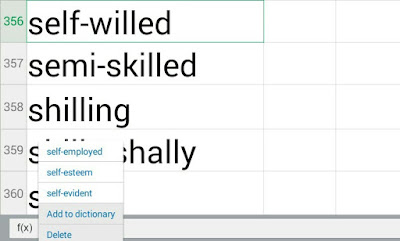We will shortly be arriving at <station-name>
If one said this in the course of normal conversation (in a rather Ionesco-esque surreal universe?) the intonation would be something like this:
But instead of recording We will shortly be arriving at Iver, We will shortly be arriving at Langley, We will shortly be arriving at Slough ... etc etc ad nauseam, and running up enormous recording bills, they have recorded just We will shortly be arriving at ... (note the "...", what happens when there‘s nothing to be said is ironically quite significant) ...
...and separate recordings of individual station names.
So what the disembodied voice says is
There are two problems with this, both having to do with the way a native speaker strings sounds together, one of which works in the student's favour:
-
Pro
There is no assimilation – the squidging of sounds together to make connected speech. For example, the /æt/ (or, more probably, /ət/) can (and often does) change in sympathy with whatever follows. If the next station is Maidenhead, for example, starting with the bilabial /m/, a native speaker saying the whole sentence might say /əp 'meɪdənhed/ (with the dental /t/ becoming the equivalent bilabial stop /p/).
<festive_note theme="point of articulation">
In Rutter‘s Shepherd's Pipe Carol the refrain startsAngels in the skyCame down from on high....... a bit of a tongue-twister I find (nearly every Christmas). Musing on points of articulation, I recently realized why; although clarity of enunciation isn't my forte, anyone might find the second line a bit of a trouble-maker (aided and abetted by the context established in the first). The consonants in came are the velar /k/ and the bilabial nasal /m/; down starts with a /d/ (dental) and ends with another dental (but this time it's the nasal /n/); from starts with a consonant pair – but the first is the labio-dental /f/, and at the end there's another bilabial nasal.
So the points of articulation (places where sounds are made, but in this case [beginnings and ends] articulation also works in the same way as it does in an articulated lorry):
CAME Velar (back of mouth)last: Bilabial (front of mouth)
DOWN Dental (halfway back)last: Dental (again)
FROM Labio-dental (not quitethe front, but pretty near)last: BilabialJust considering the first consonant in these three words (marked in bold), there is no problem:Came down from...Velar => Dental => Labio-dental – the point of articulation is moving steadily forwards. But factoring in the ends of the words, the peaceful (pastoral?) picture is disrupted. After the bilabial nasal at the end of Came there is the temptation to take the path of least resistance...<digression>
The path of least resistance is often significant in the way speech sounds develop, but... Update, maybe.
</digression>
...and say from; besides, came from is a temptingly Christmassy collocation – came from afar/the East/Nazareth...So I often find myself singing Came from down... and it's not until I bump into the down/high paradox that my voice peters out.
</festive_note> - Con
When the component bits of recording are spliced together, the intonation is totally wrong. There are two components: the first ends in an upward flick, a sort of auditory serif, that has the meaning "..." (in conversation this rising tone warns: I HAVEN'T FINISHED YET, SO DON'T INTERRUPT); the second starts the place-name with a rising tone, which again gives the wrong message (as a rising tone often signifies HERE COMES A NEW TOPIC).
On the homeward journey I listened again to the Tannoy. And surprisingly (not to say inefficiently, on the same service run by the same company, but just in the opposite direction) the intonation pattern was different: it still wasn't right, but at least the first bit didn't have the misleading upward flick at the end; and the intonation at the beginning of each place-name at least did not start by rising.
Still unnatural, with the tone leaping up to mark the splice, but not so bad.
b
PS And here's a clue:
Sat up 60% of the way through loud passage, but too late for this. (9)
Update 2016.02.11.14:15 – Fixed a few typos, deleted old footer and added PPS.
PPS The possible update mentioned in the digression from the festive note (which itself was something of a digression) has taken the form of a new post. And here's another clue:
Beseech Barnaby (fat chance!) (8)
Update 2016.02.12.10:30 – Added PPPS
PPPS A further thought on the subject of point of articulation, that arose last summer and may be of interest to choral singers. My choir was singing a setting of these words (from The Merry Wives of Windsor):
Then I realized how clever (intuitive?, lucky?) Shakespeare had been. The points of articulation of the initial consonants move from the back of the mouth to the front:
Update 2016.03.12.17:50 – Supplied crossword answers:
FORETASTE and BEGRUDGE
Update 2016.02.11.14:15 – Fixed a few typos, deleted old footer and added PPS.
PPS The possible update mentioned in the digression from the festive note (which itself was something of a digression) has taken the form of a new post. And here's another clue:
Beseech Barnaby (fat chance!) (8)
Update 2016.02.12.10:30 – Added PPPS
PPPS A further thought on the subject of point of articulation, that arose last summer and may be of interest to choral singers. My choir was singing a setting of these words (from The Merry Wives of Windsor):
Pinch him, and burn him, and turn him about,These are the last words of the piece, with very quick notes and an extreme diminuendo, so it's important to watch the conductor. It seemed to me that the only way to do this was to learn it by heart. So far so unsurprising. The three nouns in the last line were a problem; how to remember the order?
Till candles and star-light and moonshine be out.
Then I realized how clever (intuitive?, lucky?) Shakespeare had been. The points of articulation of the initial consonants move from the back of the mouth to the front:
/k/ (velar) > /s/ (alveolar ridge) > /m/ (bilabial)So, as the music dwindles away to nothing (or a niente, as the Italians have it) the choir can whisper more and more with the point of articulation moving closer and closer to the audience and maintaining clarity.
Update 2016.03.12.17:50 – Supplied crossword answers:
FORETASTE and BEGRUDGE



















